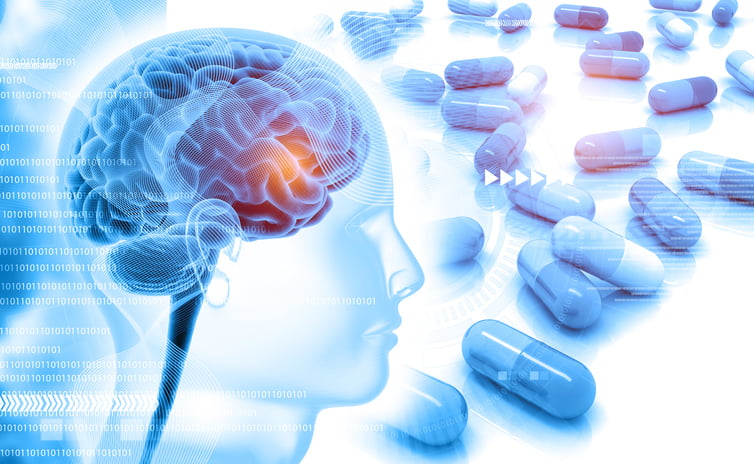Feeling a bit forgetful lately? Does your mind sometimes feel like it’s in a fog? You’re not alone. As we age, our brains naturally undergo changes, and it’s common to experience occasional memory lapses or difficulty concentrating. But the good news is, you can take steps to support your brain health. Let’s explore how essential brain vitamins and supplements can help keep your mind sharp and focused. Let’s uncover the best vitamins for brain health.
Best Brain Vitamins
Many vitamins play a role in keeping your mind sharp. Some of the key players include:
- Vitamin B12: Essential for brain function and mood.
- Vitamin D: Linked to improved memory and cognitive function.
- Vitamin E: Acts as an antioxidant, protecting brain cells.
- Folate: Important for brain development and function.
What vitamins are good for brain health?
While vitamins are crucial, combining them with brain-boosting foods is even better. Here are some power duos:
- Omega-3 fatty acids (found in fish, flaxseed, and walnuts) and vitamin E: Work together to protect brain cells.
- Vitamin B12 and folate (found in leafy green vegetables and beans): Essential for healthy brain function.
- Vitamin D (found in fatty fish, egg yolks, and fortified milk) and calcium: Support brain health and reduce the risk of cognitive decline.

What is the best vitamin for the Brain?
Choosing the best vitamin for the brain can be tricky. Look for one specifically formulated for brain health that includes:
- B vitamins (B12, folate, thiamine)
- Vitamins D and E
- Omega-3 fatty acids
Always check with your doctor before starting any new supplement.
What are the Best Brain Supplements?
Besides vitamins, other supplements can benefit your brain:
- Ginkgo biloba: May improve memory and focus.
- Acetyl-L-carnitine: Could help with brain energy and memory.
- Phosphatidylserine: Might enhance cognitive function.
Remember, more research is needed to fully understand these supplements.
What are the Supplements that are Good for Brain Health?
Some supplements support both your brain and overall health:
- Coenzyme Q10 (CoQ10): Supports energy production and brain function.
- Magnesium: Essential for many bodily functions, including brain health.
- Zinc: Plays a role in brain development and function.
Does Omega 3 Fatty Acid Improve Brain Health?
Absolutely! Omega-3 fatty acids are often referred to as “superfoods” for the brain due to their profound impact on cognitive health. These essential fats play a crucial role in building and maintaining brain cells, particularly in the grey matter regions associated with memory and cognitive processing.
1. Building Brain Cells:
Omega-3 fatty acids, especially DHA (docosahexaenoic acid), are fundamental components of cell membranes in the brain. They support the structure and fluidity of these membranes, which is essential for the efficient transmission of signals between brain cells. This structural support is vital for overall brain health and function.
2. Improving Memory:
Regular consumption of omega-3s has been linked to improved memory and learning capabilities. Studies have shown that individuals with higher levels of DHA tend to perform better in memory tests. Omega-3s help enhance synaptic plasticity, which is crucial for learning and memory formation.
3. Reducing Inflammation:
Omega-3 fatty acids possess powerful anti-inflammatory properties. Chronic inflammation can negatively affect brain health and has been associated with cognitive decline and neurodegenerative diseases such as Alzheimer’s. By reducing inflammation, omega-3s help protect the brain from damage and promote a healthy environment for cognitive function.
To reap the benefits of omega-3s, aim to include sources like fatty fish (salmon, mackerel, sardines), flaxseed, chia seeds, and walnuts in your diet. Incorporating these foods regularly can contribute significantly to maintaining and improving brain health. If you have dietary restrictions or find it challenging to get enough omega-3s from food, consider discussing omega-3 supplements with your healthcare provider to ensure you’re meeting your brain’s nutritional needs.
What Vitamins Can Help My Memory Loss?
Worried about forgetting things? Certain vitamins can help support your memory:
- Vitamin B12: Crucial for brain cells and linked to improved memory.
- Vitamin E: Acts as an antioxidant, protecting brain cells from damage.
- Folate: Helps produce neurotransmitters important for memory.
Which Vitamin Helps Improve Cognitive Function and Memory?
Several vitamins boost your brainpower:
- Vitamin B6: Supports brain chemistry and communication.
- Vitamin D: Linked to better memory and thinking skills.
- Omega-3 fatty acids: Essential for brain health and memory.

What are the Best Vitamins for Brain Development for Adults?
While often associated with children, brain development continues into adulthood. These vitamins are key:
- Vitamin B12: Supports brain cell growth and repair.
- Folate: Essential for producing new brain cells.
- Vitamin D: Linked to improved cognitive function.
What Vitamins are Good for Brain Fog and Memory?
Struggling with brain fog? These vitamins might help:
- Vitamin B12: Reduces fatigue and improves mental clarity.
- Vitamin D: Linked to decreased brain fog and better focus.
- Omega-3 fatty acids: Can improve brain function and reduce brain fog.
Do Any of the Brain Supplements Actually Work?
While some brain supplements show promise, more research is needed. Popular options include:
- Ginkgo biloba: May improve memory and focus.
- Acetyl-L-carnitine: Could boost brain energy and memory.
- Phosphatidylserine: Might enhance cognitive function.
Always talk to your doctor before trying new supplements.
What is the #1 Brain Supplement?
It’s tough to crown one supplement as the absolute best. However, many people find fish oil (rich in omega-3 fatty acids) beneficial for overall brain health.
What is the One Vitamin Your Brain Must Have?
While all the vitamins we’ve discussed contribute to brain health, vitamin B12 stands out as a superstar. It’s essential for producing red blood cells that carry oxygen to your brain. B12 also helps with brain cell repair and function. A deficiency can lead to problems with memory, mood, and concentration.
What Vitamins Sharpen Memory?
To sharpen your memory, focus on these vitamins:
- Vitamin B12: Crucial for brain cell function and memory.
- Vitamin E: Protects brain cells from damage.
- Omega-3 fatty acids: Improve brain function and memory.
What is the Best Natural Brain Booster?
Nature offers many brain boosters. Here are a few:
- Omega-3 rich foods: Fatty fish, flaxseeds, walnuts
- Leafy green vegetables: Packed with vitamins and antioxidants
- Berries: Contain antioxidants that protect brain cells
- Whole grains: Provide sustained energy for the brain
What is the Super Supplement for the Brain?
While there’s no magic pill, fish oil is often considered a super supplement for the brain. It’s rich in omega-3 fatty acids, which are essential for brain health.
What is the Best Vitamin for the Adult Brain?
The best vitamin for adult brains is a balanced approach. However, vitamin B12 deserves special mention due to its crucial role in brain function.
What Vitamins are Good for Brain Fog and Memory?
Brain fog and memory issues can be frustrating. While these symptoms can have various causes, certain vitamins can play a role in improving brain function.
Vitamin B12
- Crucial for brain function: Vitamin B12 is essential for the health of nerve cells and red blood cells, which carry oxygen to the brain.
- Reduces fatigue: A deficiency can lead to fatigue, which can contribute to brain fog.
- Improves mental clarity: Adequate B12 levels are linked to better focus and concentration.
Vitamin D
- Supports cognitive function: Research suggests a link between vitamin D deficiency and cognitive decline.
- Reduces inflammation: Inflammation can negatively impact brain health. Vitamin D has anti-inflammatory properties.
- Enhances mood: Low vitamin D levels are associated with mood disorders, which can contribute to brain fog.
Omega-3 Fatty Acids
- Essential for brain health: These healthy fats are building blocks for brain cells.
- Reduces inflammation: Omega-3s have anti-inflammatory effects, which can benefit brain function.
- Improves memory: Studies suggest that omega-3s can enhance memory and cognitive performance.
What Vitamins are Good for the Brain and Nervous System?
A healthy brain and nervous system go hand-in-hand. These vitamins support both:
B Vitamins (B6, B12, and Folate)
- Essential for neurotransmitter production: These vitamins are involved in creating the chemical messengers that facilitate communication between brain cells.
- Support energy metabolism: They help convert food into energy, which is vital for brain function.
- Protect against cognitive decline: Studies suggest that adequate B vitamin levels may help reduce the risk of cognitive decline and neurodegenerative diseases.
Apart from this, Vitamin D, Magnesium and Omega-3 fatty acids
Is There a Brain Supplement That Actually Works?
While research is ongoing, some people find relief with supplements like fish oil, ginkgo biloba, or acetyl-L-carnitine. However, it’s essential to consult your doctor before starting any new supplement.
Remember: While vitamins and supplements can support brain health, they’re not a magic cure. A healthy lifestyle with regular exercise, a balanced diet, and sufficient sleep is equally important. Nourishing your brain with the right nutrients is essential for optimal cognitive function. While vitamins and supplements can play a supportive role, they’re not a magic solution. A holistic approach that includes a balanced diet, regular exercise, adequate sleep, and mental stimulation is key to maintaining a healthy brain.
Vitamins B6, B12, and folate are crucial for brain function and memory. Vitamin E is an antioxidant that protects brain cells. Omega-3 fatty acids, while not strictly vitamins, are essential for brain health and cognitive function.
Some supplements can support brain health, but it’s important to approach them with caution. While there’s evidence supporting the benefits of certain supplements like omega-3 fatty acids, ginkgo biloba, and acetyl-L-carnitine, more research is needed. Always consult your doctor before starting any new supplement.
Omega-3 fatty acids are essential for brain cell structure and function. They help improve memory, reduce inflammation, and support overall brain health.
Vitamins B12 and D are often linked to improved mental clarity and reduced brain fog. Omega-3 fatty acids also play a role in cognitive function and can help alleviate brain fog symptoms.
There’s no one-size-fits-all answer, as individual responses to supplements vary. Fish oil (rich in omega-3 fatty acids) is often recommended for overall brain health. However, it’s essential to consult with a healthcare professional to determine the best supplement for your specific needs.
Incorporate fatty fish, nuts, seeds, leafy green vegetables, and whole grains into your diet for a brain-boosting nutritional intake. These foods are rich in vitamins, minerals, and antioxidants essential for brain health.
Multivitamins provide a range of essential nutrients, including vitamins and minerals important for brain function. However, they might not be as effective as getting these nutrients from whole foods.
Ginkgo biloba, ginseng, and turmeric are popular natural supplements often associated with brain health benefits. However, scientific evidence supporting their effectiveness is limited.
Some people may experience side effects from brain supplements, such as headaches, digestive issues, or sleep disturbances. It’s essential to follow the recommended dosage and consult your doctor if you experience any adverse reactions.
The time it takes to notice improvements varies depending on the individual, the specific vitamin or supplement, and the underlying issue. Some people may experience benefits within a few weeks, while others might not see results for several months.




